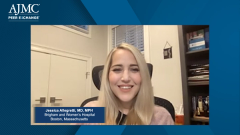
Evolving Medical Policies and Unmet Needs in C. Diff Infection Management
Panelists review unmet needs in clostridium difficile infection management and consider how medical policies are evolving to address them.
Episodes in this series

Transcript:
Neil Minkoff, MD: Let me ask this question. We’ve talked a lot about what’s going on in this space. We’ve talked about some of the different medications, the difficulty of treatment, recurrence, and when to accelerate to a higher level of treatment. I want to open this up to everybody: What’s the biggest unmet need in recurrent Clostridioides difficile infection, whether it’s your coverage policy or your practice? What do you think would be the best thing for us to address?
Jessica Allegretti, MD, MPH: In the big picture, the best thing we could do for patients long term is primary prevention. If we can prevent C diff from even happening, then we don’t have to worry about recurrent C diff. That includes things like vaccines and some of these primary preventive agents. Or when patients are going into the hospital and getting on broad spectrum antibiotics, how can we prevent that subsequent C diff infection? That’s probably the biggest unmet need and the most exciting place to be working to prevent this from happening at all.
That being said, in lieu of that, we need more effective therapies to treat and eradicate recurrent C diff to ultimately result in decolonization and not keep these patients in a vulnerable microbiome space, if you will. I’m very pleased and excited to see all these novel microbiome therapeutics being studied.
We need FDA-approved therapies. I’m a true believer in FMT [fecal microbiota transplantation]. Obviously, I believe in the safety and efficacy of that product. It’s never going to be FDA approved. That’s quite clear to all of us. In lieu of that, we need products that we can use that are effective and safe. From my perspective, that’s what we need right now.
Neil Minkoff, MD: Any others?
Dale N. Gerding, MD: I agree. Primary prevention is where we need to be. There’s 1 vaccine pending; we’ve been waiting a long time for the announcement. One has already failed. But there are other modalities coming that will also be effective in primary prevention if we can establish those methodologies. However, those are still in the research stage.
But in the case of preventing recurrence, we need a safe, effective, and cost-effective way to prevent C diff recurrences that you can use with the first episode. We need to get on top of this as soon as it occurs the first time, because the real need here is to prevent patients from having any recurrences at all. We’re focused on multiple recurrences because they’re devastating to people, both emotionally and physically.
We also need to find the means to develop treatment agents that will prevent recurrence with the first episode. One of the big barriers right now is the cost of these preventive agents. Everything we’ve talked about so far has been more expensive than standard therapies. You’re trying to weigh the benefit of those more expensive therapies against their acquisition cost. We need something that works well, is safe, and doesn’t cost a whole lot.
Neil Minkoff, MD: You just defined the holy trinity.
Kevin U. Stephens, Sr. MD, JD: Absolutely. That’s right on point, because obviously it’s a balancing system, and you have to figure out outcomes vs cost vs patient satisfaction. To answer your question about what we need, we need more studies, research, randomized studies that show the effectiveness and cost-benefit, or CBAs [cost-benefit analyses], as we call it. That can help push us to better decisions, particularly as a payer.
Karina Abdallah, PharmD: I agree. Our unmet needs are FDA approval and new agents. Even if we don’t get Dr Gerding’s full wish list with lower cost, at least proven success. The ability to prove that being proactive will ultimately bring down not only the cost but also improve patient experience. Earlier on, Dr Allegretti took us through what a horrible experience this can be, not only for the patient but for their family. It’s important to bring in that whole picture. Dr Stephens earlier also mentioned behavioral health. Maybe even bringing that under the behavioral health umbrella and connecting it with nursing case management on the payer side. Most payers have a good, strong force of nursing case management. Maybe connecting that with hospital discharges, that can be an unmet need as well that we touched on a little.
It’s about being as proactive as we can and not only looking at the recurrent C diff population. Some quick statistics: before Medicare Advantage, a third of the primary cases end up in recurrence. It’s important to target the primary cases and be as proactive as possible, tracking what their risk factors are and what therapies they’re on. Are they following up with GI [gastrointestinal] or ID [infectious disease] physicians to manage their care all the way through? Connecting any coordination that we can do between the payer, health system, facility, and even at home for the patients is key.
Transcript edited for clarity.
Newsletter
Stay ahead of policy, cost, and value—subscribe to AJMC for expert insights at the intersection of clinical care and health economics.














